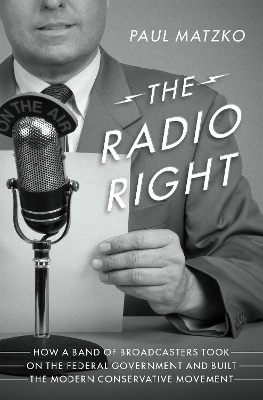
The Radio Right
Oxford University Press Inc (Verlag)
978-0-19-007322-0 (ISBN)
The Radio Right tells the story of the 1960s far Right, who were frustrated by what they perceived to be liberal bias in the national media, particularly the media's sycophantic relationship with the John F. Kennedy administration. These people turned for news and commentary to a resurgent form of ultra-conservative mass media: radio. As networks shifted their resources to television, radio increasingly became the preserve of cash-strapped, independent station owners who were willing to air the hundreds of new right-wing programs that sprang up in the late 1950s and 1960s. By the early 1960s, millions of Americans listened each week to conservative broadcasters, the most prominent of which were clergy or lay broadcasters from across the religious spectrum, including Carl McIntire, Billy James Hargis, and Clarence Manion. Though divided by theology, these speakers were united by their distrust of political and theological liberalism and their antipathy towards JFK. The political influence of the new Radio Right quickly became apparent as the broadcasters attacked the Kennedy administration's policies and encouraged grassroots conservative activism on a massive scale.
Matzko relates how, by 1963, Kennedy was so alarmed by the rise of the Radio Right that he ordered the Internal Revenue Service and Federal Communications Commission to target conservative broadcasters with tax audits and enhanced regulatory scrutiny via the Fairness Doctrine. Right-wing broadcasters lost hundreds of stations and millions of listeners. Not until the deregulation of the airwaves under the Carter and Reagan administrations would right-wing radio regain its former prominence. The Radio Right provides the essential pre-history for the last four decades of conservative activism, as well as the historical context for current issues of political bias and censorship in the media.
Paul Matzko is a historian who specializes in the intersection of politics, religion, and mass media in modern America. He currently works at the Cato Institute as the Assistant Editor for Tech and Innovation for Libertarianism.org and is the host of the weekly podcast Building Tomorrow.
List of Figures
Glossary
Chapter 1- Intro: "Every Hate-Monger, Radio Preacher and Backwoods Evangelist"
Chapter 2- Conservative Radio, the Polish Ham Boycott, and the Creation of a Right-Wing Social Movement
Chapter 3- Seven Days in May or: How the Kennedys Learned to Stop Worrying and Love the Radio Right
Chapter 4- Just Because You're Paranoid Doesn't Mean They Aren't After You: Putting the Reuther Memorandum to
Work
Chapter 5- "The Red Lion Roars Again": The Fairness Doctrine, the Democratic National Committee, and the
Election of 1964
Chapter 6- Outsourcing Censorship: How the National Council of Churches Silenced Fundamentalist
Broadcasters
Chapter 7- The Radio Right in Decline
Chapter 8- Conclusion: From Radio Ronald Reagan to Donald Trump's Tweets
Appendix
Bibliography
| Erscheinungsdatum | 12.06.2020 |
|---|---|
| Zusatzinfo | 25 illustrations |
| Verlagsort | New York |
| Sprache | englisch |
| Maße | 244 x 160 mm |
| Gewicht | 544 g |
| Themenwelt | Geschichte ► Allgemeine Geschichte ► Zeitgeschichte |
| Geisteswissenschaften ► Geschichte ► Regional- / Ländergeschichte | |
| Geschichte ► Teilgebiete der Geschichte ► Kulturgeschichte | |
| ISBN-10 | 0-19-007322-5 / 0190073225 |
| ISBN-13 | 978-0-19-007322-0 / 9780190073220 |
| Zustand | Neuware |
| Haben Sie eine Frage zum Produkt? |
aus dem Bereich


